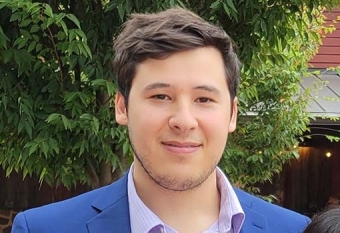
Juan Chamorro, a postdoctoral researcher in UC Santa Barbara’s Materials Department, has received a Mathematical and Physical Sciences Ascending Postdoctoral Research Fellowship (MPS-Ascend) from the National Science Foundation (NSF). The prestigious fellowship amounts to $100,000 per year for up to three years. The program supports outstanding future scientists who will broaden the participation of underrepresented minorities as future leaders in MPS fields and facilitates their transition from postdoctoral researchers into a faculty appointment.
“I feel humbled that the NSF has chosen me for this award, and I look forward to furthering my research into new phases and phenomena in crystalline materials,” said Chamorro, who is co-advised by materials professors Stephen Wilson and Ram Seshadri. “It also tells me that someone thought my research proposal was worth pursuing, so it motivates me to continue along this career path.”
Through the NSF fellowship, Chamorro will use computation to predict, chemical synthesis to create, and physical characterization techniques to measure materials with unique crystal structures and electronic behaviors. Specifically, he is focused on discovering more intrinsically conductive polar metals and other interesting materials phases, such as polar superconductors. Polar superconductors are materials that beneath a certain temperature conduct electricity with zero resistance and generate extraordinarily large magnetic fields. These materials are used in applications where strong magnetic fields are required, such as in resonance imaging (MRI) and spectroscopy, but their applications are limited by the extremely low temperatures normally required for superconductivity to occur. Chamorro believes his research could lead to superconductors that operate at higher temperatures, potentially facilitating their integration into modern technologies.
“The discovery of new polar metals would allow us to find more applications for them in technologies where one needs materials that have both metallicity and long-range polarization,” said Chamorro. “If my proposed hypothesis is correct, then the systematic introduction of mobile electrons into these materials and subsequent structural destabilization may give rise to new quantum materials and superconductors. The materials could potentially revolutionize the fields of medicine, transportation, energy, and computation.”
Chamorro was born in Miami and moved to El Salvador at the age of ten. He returned to the United States to attend Johns Hopkins University, where he earned his bachelor’s degree and PhD in chemistry. As a Salvadoran American, Chamorro says that he is acutely aware of the lack of diversity in the science, technology, engineering, and mathematics (STEM) fields. He believes institutions like the NSF should actively seek to fund projects and students from backgrounds that better represent the nation’s diversity. The program also provides opportunities for fellows to apply for future support once they have accepted tenure-track positions at a U.S. college or university.
“With fellowships like the MPS-Ascend, the NSF is taking initiatives in the right direction toward diversity and inclusion in academia. As a fellow, I will strive to be as inclusive as possible, work with students from all backgrounds, and continue to pursue innovative research,” said Chamorro. “I am passionate about scientific discovery and aspire to become a professor in materials, and this fellowship is an opportunity for me to manage my own funding, perform cutting-edge research at UCSB, play my part in expanding diversity in academia, and mentor young, aspiring scientists.”
His co-advisors say that they are looking forward to see where this fellowship pushes his research and career trajectory.
“I’m ecstatic for Juan. He brings a lot of creative energy and new ideas to his research in superconductivity, and I can’t think of anyone more deserving of an Ascend fellowship,” said Wilson, co-director of UCSB’s Quantum Foundry. “The fellowship will allow Juan to pursue a number of interesting ideas he has in the field of super-conductivity research. I’m excited to see what his research here at UCSB brings.”
“Juan brings the ideal combination of experimental and computational expertise to the project that he has proposed to carry out on quantum materials,” said Seshadri, Chamorro’s co-advisor, a distinguished professor in the Materials Department and the Department of Chemistry & Biochemistry. “He has also shown himself to be an exceptional mentor, someone who graduate students and undergraduate interns naturally turn to for help in the lab. The fellowship will serve Juan well as a key stepping-stone into the professoriate.”



